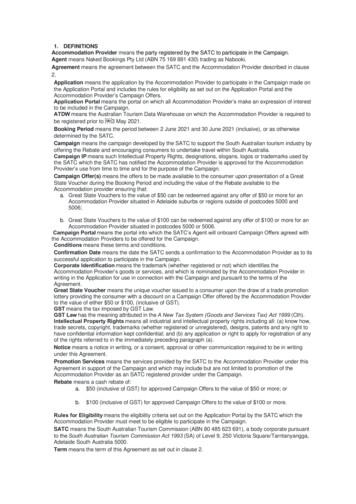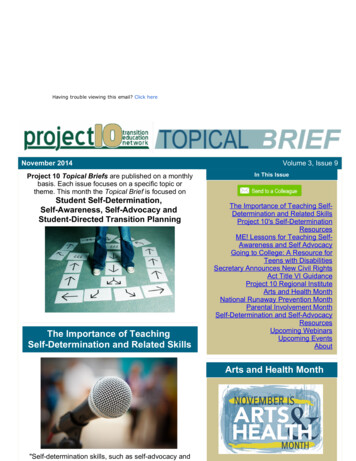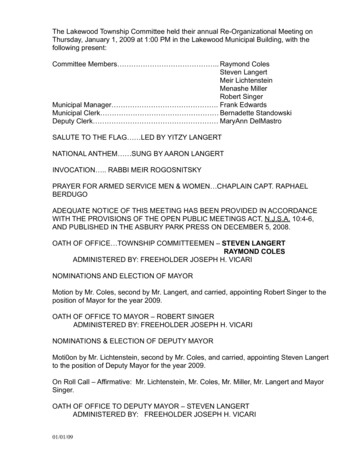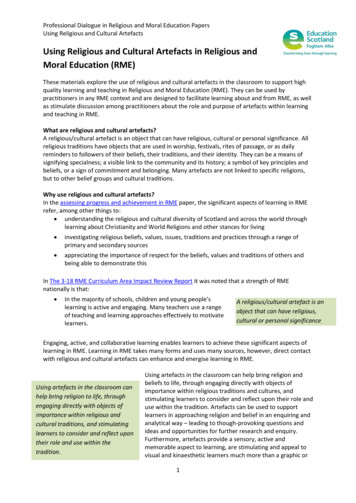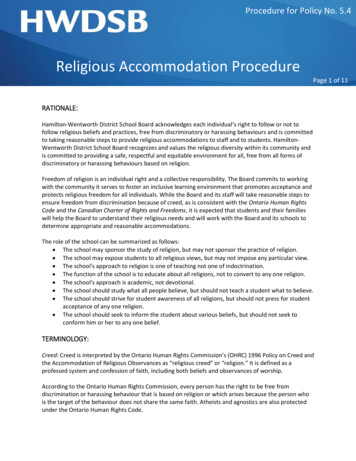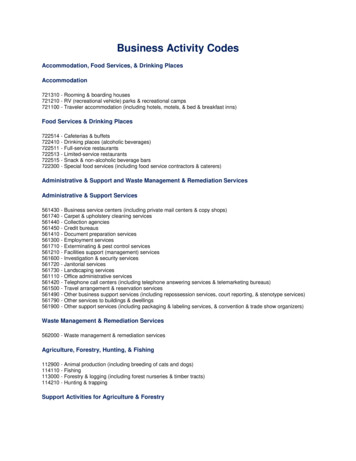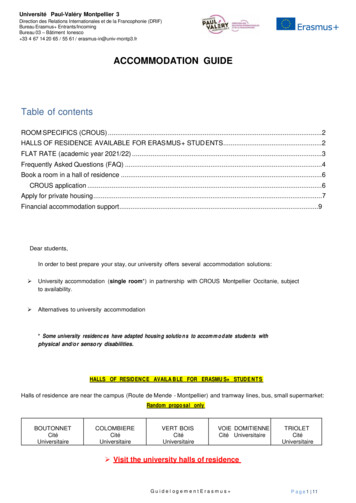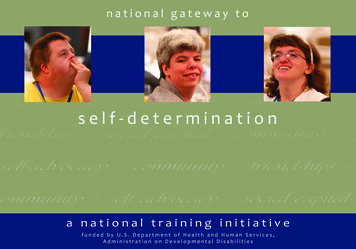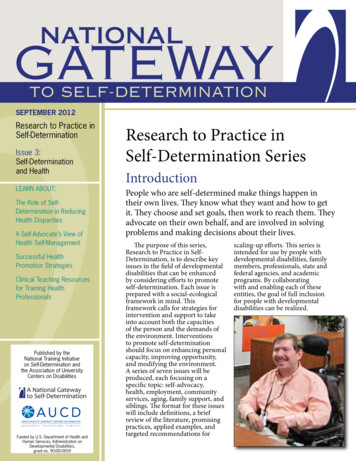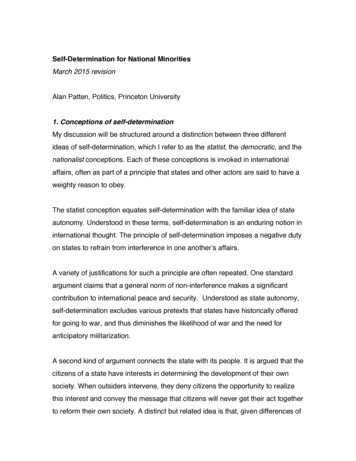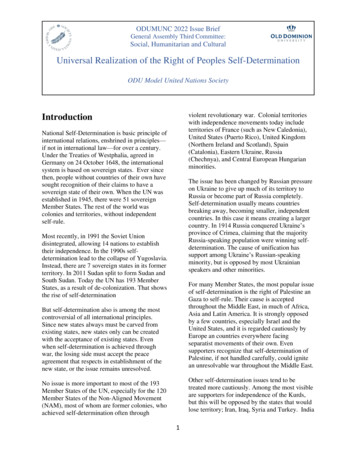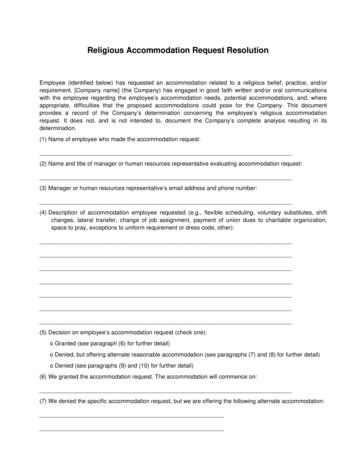
Transcription
Religious Accommodation Request ResolutionEmployee (identified below) has requested an accommodation related to a religious belief, practice, and/orrequirement. [Company name] (the Company) has engaged in good faith written and/or oral communicationswith the employee regarding the employee’s accommodation needs, potential accommodations, and, whereappropriate, difficulties that the proposed accommodations could pose for the Company. This documentprovides a record of the Company’s determination concerning the employee’s religious accommodationrequest. It does not, and is not intended to, document the Company’s complete analysis resulting in itsdetermination.(1) Name of employee who made the accommodation request:(2) Name and title of manager or human resources representative evaluating accommodation request:(3) Manager or human resources representative’s email address and phone number:(4) Description of accommodation employee requested (e.g., flexible scheduling, voluntary substitutes, shiftchanges, lateral transfer, change of job assignment, payment of union dues to charitable organization,space to pray, exceptions to uniform requirement or dress code, other):(5) Decision on employee’s accommodation request (check one):o Granted (see paragraph (6) for further detail)o Denied, but offering alternate reasonable accommodation (see paragraphs (7) and (8) for further detail)o Denied (see paragraphs (9) and (10) for further detail)(6) We granted the accommodation request. The accommodation will commence on:(7) We denied the specific accommodation request, but we are offering the following alternate accommodation:
Page 2(8) Reason for denying specific accommodation request and offering alternate accommodation:(9) We denied the accommodation request because (check all that apply):o The employee’s belief, practice, or requirement does not meet Title VII’s definition of “religion.”o The employee’s religious belief, practice, and/or requirement are not sincerely held.o The accommodation would not be effective.o The accommodation would require removal of an essential job function.o The documentation provided does not adequately support the request.o The accommodation would require lowering of a performance or production standard.o The accommodation would cause an undue hardship to the organization.o The accommodation would create a direct threat to the safety of employee or others.o Employee did not respond to information requested and/or additional information is necessary to evaluatethe accommodation request.o The employee did not respond to inquiries about the requested accommodation on the followingdates: [insert dates].o Other(10) Additional detail on reason(s) for denial of accommodation request:(11) To request reconsideration of the denial of the accommodation request (including, if applicable, asking forreconsideration of an offered alternate accommodation), please submit a written request to [CompanyRepresentative Name], [Title] at [contact information of company representative] within [number] of days ofreceiving a denial.Name:[NameofManagerorHRRepresentative]
Page 3Title:Date: [Date][Title]ACKNOWLEDGMENTI, [Employee Name], acknowledge receipt of this Religious Accommodation Request Resolution on [Date].Name:[NameTitle: [Title]ofEmployee]FOR ALTERNATE ACCOMMODATIONS ONLY: On [Date], I, [Employee Name], accepted the alternateaccommodation offered in Paragraph (7) of this Religious Accommodation Request Resolution.Name:[NameTitle: [Title]ofEmployee]
Summary of Form EditsReligious Accommodation Request ResolutionNo content available. About LexisNexis Privacy Policy Terms & Conditions Copyright 2018 LexisNexis
Drafting Notes & Alternate ClausesReligious Accommodation Request ResolutionDrafting NotesDrafting Note to Introductory ParagraphTitle VII of the Civil Rights Act of 1964 (Title VII) requires employers to reasonably accommodate anindividual’s religious practices or beliefs, unless the accommodation imposes an undue hardship on theemployer’s business operations. The employer should complete this form and provide it to the employeeafter the employer has engaged in an interactive process with the employee concerning the employee’saccommodation request. While providing a written resolution form to a Title VII religious accommodationrequest is not required, it is recommended as a best practice.For detailed guidance on Religious Accommodation under Title VII, see Religious AccommodationRequirements. For an annotated Title VII request for accommodation form, see Religious AccommodationRequest (Title VII). For an annotated religious accommodation policy, see Religious AccommodationPolicy.For information on state-specific religious accommodation issues, see Discrimination, Harassment, andRetaliation State Practice Notes Chart. For state-specific religious accommodation policies, seeDiscrimination, Harassment, and Retaliation State Expert Forms and Checklists Chart.Drafting Note to Paragraph (4)An individual’s set of beliefs will meet Title VII’s definition of a “religion” if they are sincere, meaningful, andoccupy a place in the life of an individual similar to that filled by organized religions’ belief in a supremebeing. Adeyeye v. Heartland Sweeteners, LLC, 721 F.3d 444 (7th Cir. 2013) (quoting U.S. v. Seeger, 380U.S. 163, 165-66 (1965)). A belief in some form of deity is not required for Title VII protection, as reflectedby the courts’ recognition that atheism is a religion. Section 12 of the EEOC Compliance Manual states that“religion” under Title VII includes both theistic beliefs and practices and non-theistic moral and ethicalbeliefs. See EEOC Compliance Manual § 12-I(A)(1).Most courts apply a two-factor test to determine whether a set of beliefs is a “religion” in the context of TitleVII’s accommodation requirement:(1) The belief necessitating the accommodation must actually be “religious” in the individual’s own schemeof things.(2) The belief must be sincerely held by the individual.See, e.g., Van Koten v. Family Health Management, 955 F. Supp. 898, 902 (N.D. Ill. 1997) (citing Redmondv. GAF Corp., 574 F.2d 897, 900 n.12 (7th Cir. 1978)).The EEOC’s test—which is similar, but not identical to the above-outlined test applied by most courts—sheds some light on what beliefs are “religious” for purposes of Title VII. The EEOC defines “religious”beliefs to include “moral or ethical beliefs as to what is right and wrong which are sincerely held with thestrength of traditional religious views.” EEOC Compliance Manual § 12-I(A)(1). See 29 C.F.R. § 1605.1.Once an employee provides an employer with notice of the need to accommodate a particular religiouspractice or belief, both the employer and the employee must engage in an interactive process to determinewhether an accommodation is possible. Ansonia Bd. of Educ. v. Philbrook, 479 U.S. 60, 69 (1986). Theemployee must identify those employment practices or rules that interfere with his or her religious belief so About LexisNexis Privacy Policy Terms & Conditions Copyright 2018 LexisNexis
that the employer can assess whether an accommodation is available. The employer then has theobligation to consider—in good faith—whether an accommodation is possible and whether suchaccommodation poses an undue hardship on its business operations.A “reasonable accommodation” is an accommodation that eliminates the conflict between the employmentrequirements and the employee’s religious beliefs. Title VII does not require the employer to satisfy all ofthe employee’s requests; it only needs to eliminate the conflict with the employee’s religious beliefs.Drafting Note to Paragraph (6)Title VII’s broad definition of “religion” leads many courts to resolve disputes in favor of coverage. As aresult, the grounds on which an employer can challenge an employee’s religious beliefs are typically verynarrow.“Religious” beliefs typically involve concerns about life, purpose, and death and not social, political, oreconomic philosophies.Examples of reasonable accommodations include the following: Flexible scheduling. Reasonable accommodations often involve flexible arrival or departure times,unpaid leave, flexible break times during the work day, use of lunch period as work time in exchange forearly departure, staggered work hours, or allowing the employee the make up lost time due to religiousobservances. In July 2016, the EEOC released a fact sheet called Religion & Your Job Rights, whichprovides guidance on religious accommodation and discrimination. It includes a detailed example of flexiblescheduling as a reasonable accommodation. Voluntary substitutes or shift changes. Allowing employees to swap schedules, exchange shifts, or finda substitute to fill their scheduled work time often meet the reasonable accommodation requirement. Lateral transfer or change of job assignments. Employers should consider whether they can transferthe employee to another comparable position or limit the job duties so that they do not conflict with theemployee’s religious beliefs or practices, provided that this accommodation would not cause an unduehardship. Payment of union dues to charitable organization. Where the employee’s religious beliefs prohibitmembership in a labor union, most employers and unions permit the employee to choose a charitableorganization to which it can donate an amount equivalent to the union dues. Providing space to pray. Where the employee’s religious beliefs require prayer during the work day,employers satisfy the reasonable accommodation requirement by providing a place to pray, either duringwork or break time. Exceptions to uniform requirements or dress codes. Unless doing so poses an undue hardship,employers should make exceptions to dress codes or uniform requirements that conflict with an employee’sreligious beliefs. For more detail on this issue, seethe sections on Dress Codes and Uniform Policies andGrooming and Personal Appearance Policies in Religious Accommodation Requirements. Also see DressCode and Grooming Policy (with Acknowledgment). For state-specific dress code and grooming policies,see the Other Policies column of Employment Policies State Expert Forms and Checklists Chart.Drafting Note to Paragraph (8)An employer is not required to offer an employee his or her preferred accommodation. EEOC v. FirestoneFibers & Textiles Co., 515 F.3d 307, 312-313 (4th Cir. 2008). All an employer needs to do is offer areasonable accommodation; once the employer does so, the employer has satisfied its obligations underTitle VII. Ansonia Bd. of Educ. v. Philbrook, 479 U.S. 60, 68 (1986). An employer is not required to show About LexisNexis Privacy Policy Terms & Conditions Copyright 2018 LexisNexis
that the offered accommodation is the “best” accommodation or that an alternative would be worse or moreof a hardship. Cloutier v. Costco Wholesale, 311 F. Supp. 2d 190, 198 (D. Ma. 2004).Drafting Note to Paragraph (9)Paragraph (9) lists employer’s reasons for denying the religious accommodation request, including unduehardship on the employer. Title VII does not require an employer to accommodate an employee’s religiousbeliefs where the accommodation would impose an undue hardship on the employer’s business operations.According to the U.S. Supreme Court, the employer must show that the accommodation would impose“more than a de minimis cost” or burden. Trans World Airlines v. Hardison, 432 U.S. 63, 84 (1977). There,the Court held that requiring an employer to deviate from a seniority system in its collective-bargainingagreement to allow an employee to have Saturdays off to observe the Sabbath would constitute an unduehardship.While the concept of “undue hardship” is a bit nebulous, both the EEOC and courts are clear that anaccommodation imposes an undue hardship where it requires “more than a de minimis cost.” 29 C.F.R. §1605.2(e). Whether a cost is “de minimis” depends on the overall size and operating cost of the employerand includes both economic costs (such as payment of overtime compensation to a substitute) and noneconomic costs (such as compromising the safety of the workplace). Generally, the EEOC does notconsider administrative costs or the infrequent payment of premium wages (such as overtimecompensation) to a substitute employee to impose an undue hardship.Note that it is more difficult for an employer to show an “undue hardship” under the ADA than for aproposed religious accommodation under Title VII. Under the ADA, “undue hardship” occurs when theproposed accommodation imposes a significant expense or difficulty (as opposed to a de minimis costunder Title VII) when factors such as an employer’s size, financial resources, and the nature and structureof its operation are considered. The Title VII test allows the employer greater leeway.For more information on undue hardship relating to religious accommodation requests under Title VII, seeReligious Accommodation Requirements.Drafting Note to Paragraph (10)Though not required under Title VII, providing a detailed, written explanation supporting the decision todeny a religious accommodation request is recommended as a best practice. Among other things, thispractice should make it easier for the employer to defend its decision if subsequently challenged by theemployee in an administrative or civil legal proceeding. For example, a properly supported document thatclearly states how the employee’s request would cause an undue hardship should protect the employeragainst an employee’s claim that the employer failed to base its decision on relevant factors.Drafting Note to Paragraph (10)Though not required under Title VII, it is also best practice to include an internal appeals process to ensurethat the employee has had sufficient opportunity to provide additional or alternate support for a religiousaccommodation request. An appeals process is consistent with Title VII’s requirement that the partiesengage in an interactive process and could very well lead to a reconsideration of the employee’s request orresult in an alternative accommodation acceptable to the parties. If nothing else, this process should lowerthe employer’s exposure to claims and bolster the employer’s defense against allegations that it violatedTitle VII. About LexisNexis Privacy Policy Terms & Conditions Copyright 2018 LexisNexis
o The employee's belief, practice, or requirement does not meet Title VII's definition of "religion." o The employee's religious belief, practice, and/or requirement are not sincerely held. o The accommodation would not be effective. o The accommodation would require removal of an essential job function.
